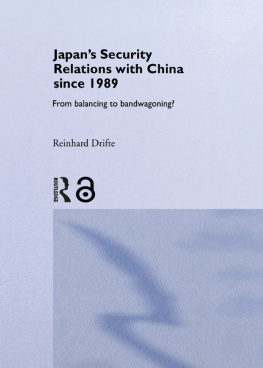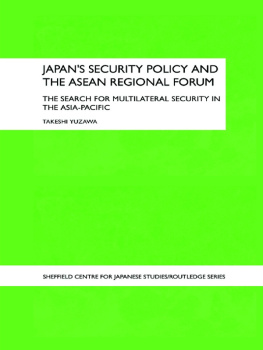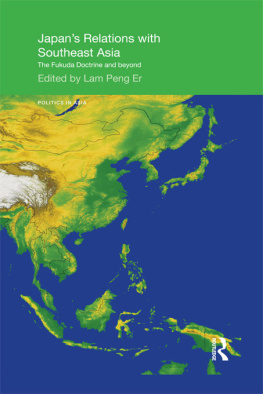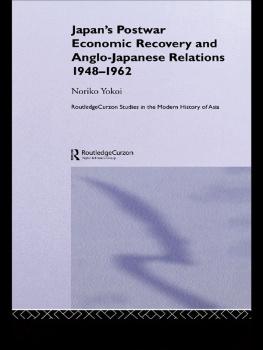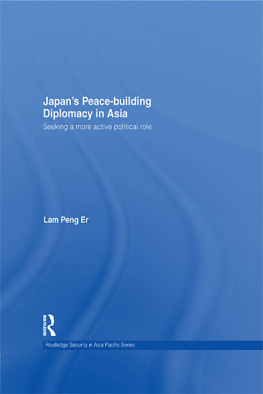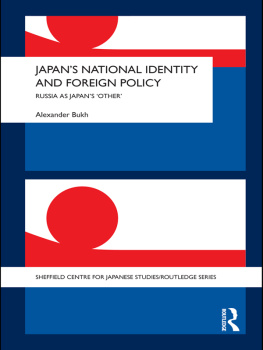First published in 1990 by Routledge
This edition first published in 2018
by Routledge
2 Park Square, Milton Park, Abingdon, Oxon OX14 4RN
and by Routledge
711 Third Avenue, New York, NY 10017
Routledge is an imprint of the Taylor & Francis Group, an informa business
1990 The Royal Institute of International Affairs
All rights reserved. No part of this book may be reprinted or reproduced or utilised in any form or by any electronic, mechanical, or other means, now known or hereafter invented, including photocopying and recording, or in any information storage or retrieval system, without permission in writing from the publishers.
Trademark notice: Product or corporate names may be trademarks or registered trademarks, and are used only for identification and explanation without intent to infringe.
British Library Cataloguing in Publication Data
A catalogue record for this book is available from the British Library
ISBN: 978-1-138-30279-2 (Set)
ISBN: 978-1-315-14875-5 (Set) (ebk)
ISBN: 978-1-138-50712-8 (Volume 2) (hbk)
ISBN: 978-1-315-14874-8 (Volume 2) (ebk)
Publishers Note
The publisher has gone to great lengths to ensure the quality of this reprint but points out that some imperfections in the original copies may be apparent.
Disclaimer
The publisher has made every effort to trace copyright holders and would welcome correspondence from those they have been unable to trace.
Japan at the Summit
Its Role in the Western Alliance and in Asian Pacific Co-operation
Shiro Saito
First published 1990
by Routledge
11 New Fetter Lane, London EC4P 4EE
Simultaneously published in the USA and Canada
by Routledge
a division of Routledge, Chapman and Hall, Inc.
29 West 35th Street, New York, NY 10001
1990 The Royal Institute of International Affairs
Phototypeset in 10pt Times by
Mews Photosetting, Beckenham, Kent
All rights reserved. No part of this book may be
reprinted or reproduced or utilized in any form or
by any electronic, mechanical, or other means, now
known or hereafter invented, including photocopying
and recording, or in any information storage or
retrieval system, without permission in writing from
the publishers.
British Library Cataloguing in Publication Data
Saito, Shiro
Japan at the Summit: its role in the Western
Alliance and in Asian Pacific cooperation.
1. Japan. Foreign relations. Policies of government,
history
I. Title
327.52
ISBN 0-415-04271-2
Library of Congress Cataloging in Publication Data
Sait, Shir, 1929
Japan at the summit: Japans role in the western alliance and
Asian Pacific cooperation / Shiro Saito.
p. cm.
Bibliography: p.
Includes index.
ISBN 0-415-04271-2
1. Japan Foreign relations 1945 2. World politics 1945
3. Summit meetings. I. Title.
DS889.5.S25 1990
327 .52dc20
8910357
CIP
The Royal Institute of International Affairs is an independent body which promotes the rigorous study of international questions and does not express opinions of its own. The opinions expressed in this publication are the responsibility of the author.
Japan is today in the middle of revolutionary changes in terms both of its internal structure and of its external environment. The risen yen symbolizes developments which affect almost the whole fabric of Japanese economic life as well as the worlds trade and business transactions. Just as Japan has been the greatest beneficiary of the US-led GATT/Bretton Woods system, it will also be the hardest hit by that systems declining efficacy. In spite of calls for a new framework of Pacific co-operation as an alternative to the weakening Bretton Woods system, the issues of leadership and structure for such a system remain a key stumbling-block.
The shift in the economic balance of power does not result in an automatic transfer of leadership in the political and security spheres. In the Western alliance system, the United States still intends to perform the supreme role in the global strategic context, despite its relative decline in economic strength. Europe tends to assume an independent political leadership, but with no global strategic role in its perception. By contrast, Japans economic and financial supremacy has hardly been translated into any politico-strategic power.
Japan now needs to redefine its perception of itself, which stems from its geopolitical circumstances, historical experiences, and domestic ruling pattern, in accordance with its changing status in the world order. The hazards of undertaking a study of the basic issues are indeed formidable. Yet it is precisely at this point of transition that the effort should be made. This book is one such endeavour.
Perhaps a few words are needed to explain my title, Japan at the Summit. Based on an idea first suggested by Professor Ronald Dore, it was conceived with two implications: first, Japan as an actor in the annual summit meetings of the seven major industrial powers; and, second, Japan as having climbed to the top of the economic ladder of world prestige. Both positions require the Japanese to learn how to attain a proper equilibrium so as to avoid the pitfalls and dangers of a hierarchical relationship not only with the West but also with their Asian neighbours, which is one of the main themes of this book.



